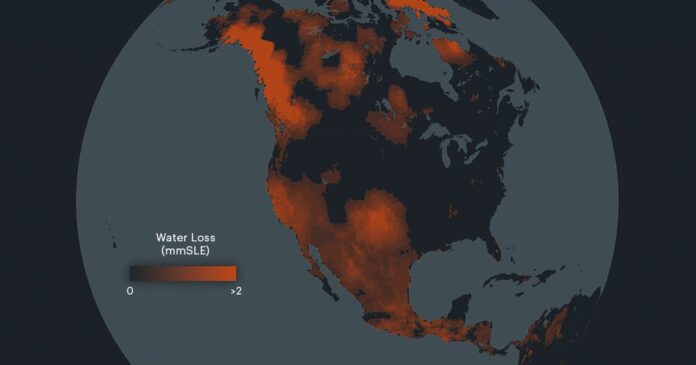"The Hidden Crisis: How Groundwater Depletion is Driving Global Water Scarcity and Sea Level Rise"
Groundwater Crisis: A Looming Threat to Global Freshwater Supplies
As climate change accelerates, the world faces an alarming depletion of its freshwater resources, particularly from underground aquifers. A recent study published in Science Advances highlights the critical state of Earth’s freshwater supply, revealing that nearly 6 billion people live in regions experiencing a net decline in water availability. This situation poses significant risks to food security and geopolitical stability.
The Study’s Findings
The research, led by Hrishikesh Chandanpurkar from Arizona State University, utilized 22 years of data from NASA’s Gravity Recovery and Climate Experiment (GRACE) satellites. The study found that while some areas are becoming wetter, the overall trend is one of "continental drying," particularly in lower latitudes. Groundwater extraction for agricultural and urban use accounts for 68% of the total loss of freshwater in these regions.
The study’s authors describe the situation as a "critical, emerging threat to humanity," noting that the landmasses are drying out at an unprecedented rate. The loss of freshwater is now one of the largest contributors to global sea level rise, surpassing even the melting of glaciers in Antarctica and Greenland.
Groundwater: A Hidden Resource
Groundwater is a vital resource, underpinning agriculture and drinking supplies for billions. Major aquifers, which took millions of years to form, are being depleted at alarming rates. The study emphasizes that much of the water extracted from these aquifers is not being replenished, as it flows into rivers and eventually the oceans, rendering it unsuitable for human use.
The researchers observed that the pace of drying has accelerated since 2014, with affected areas expanding by an average of two Californias each year. This phenomenon is creating interconnected "mega-drying" regions across Europe, the Middle East, North Africa, and parts of Asia.
Implications for Food Security and Stability
The implications of this groundwater crisis are profound. As water scarcity increases, the risk of food crises grows, potentially displacing millions. Historical examples, such as the Syrian civil war, illustrate how water shortages can lead to social unrest and conflict. The study warns that the majority of the world’s population resides in countries facing severe water stress, which could lead to widespread famine and geopolitical instability.
The Need for Governance and Policy Solutions
Experts emphasize the urgent need for effective water management policies. Current practices often prioritize short-term gains over sustainable use, leading to a cycle of depletion. For instance, California’s groundwater management act, while a step in the right direction, does not take full effect until 2040, allowing continued over-extraction.
Countries like Arizona have implemented regulations, but vast unregulated areas remain vulnerable to exploitation. The study calls for a comprehensive national water strategy that prioritizes sustainable use and recognizes water as a critical resource for national security.
Potential Solutions
The study’s authors suggest several actionable solutions to mitigate the crisis:
-
Adoption of Efficient Agricultural Practices: Technologies like drip irrigation can significantly reduce water usage in farming.
-
Water Recycling Initiatives: Cities can implement systems to recycle wastewater, as demonstrated by San Diego.
-
Public Awareness Campaigns: Encouraging individuals to adopt water-saving habits can contribute to overall conservation efforts.
- International Cooperation: Establishing a global framework for water management could help address transboundary water issues and promote equitable resource distribution.
Conclusion
The findings of this study serve as a wake-up call for governments and communities worldwide. Without immediate action to manage and conserve groundwater resources, humanity risks facing dire consequences, including food shortages, mass migrations, and increased conflict over dwindling water supplies. As climate change continues to exacerbate these challenges, the need for sustainable water management has never been more urgent.
